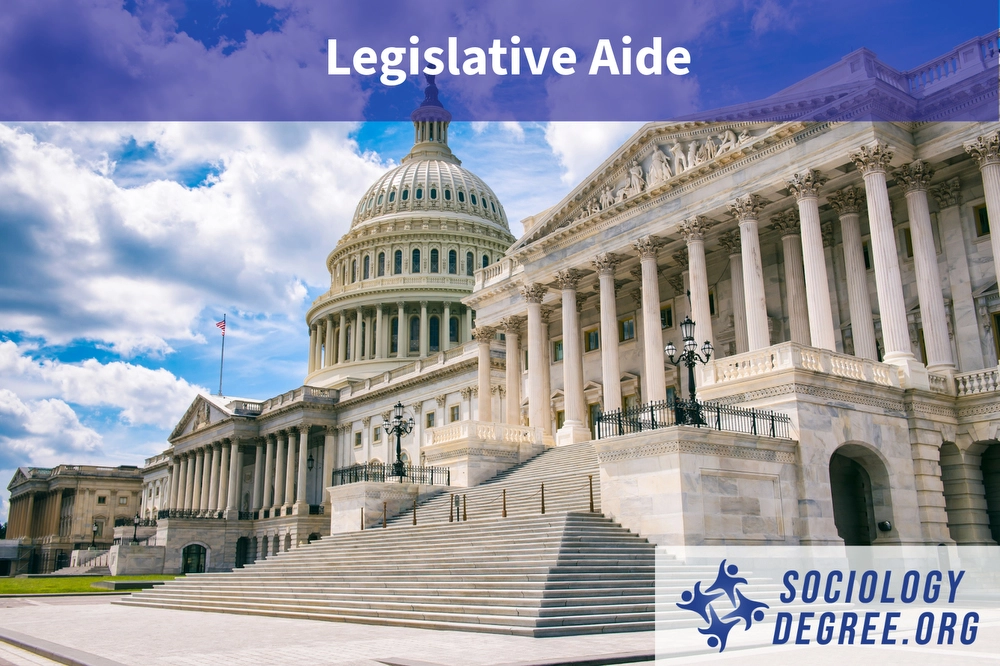A career as a legislative aide offers the opportunity to support lawmakers in drafting policies, researching legislation, and engaging with constituents. Legislative aides play a critical role in shaping public policy by providing research, analysis, and administrative assistance to elected officials. A sociology degree provides an excellent foundation for this role by equipping graduates with skills in research, policy analysis, and understanding social structures.
How to Become a Legislative Aide
What is a Legislative Aide?
A legislative aide is a professional who assists legislators in developing policies, researching issues, and managing communications with constituents. Key duties of a legislative aide include:
- Conducting research on proposed legislation and policy issues.
- Drafting reports, policy briefs, and speeches for legislators.
- Monitoring legislative proceedings and committee meetings.
- Communicating with constituents, advocacy groups, and government agencies.
- Assisting in the drafting of bills and amendments.
- Managing correspondence and scheduling for elected officials.
Legislative aides work at the federal, state, and local levels, supporting members of Congress, state legislators, and municipal government officials.
Why Get a Sociology Degree for a Legislative Aide Career?
A degree in sociology is an ideal starting point for a career as a legislative aide. Sociology focuses on understanding social issues, public policy, and research techniques, making it highly relevant to legislative work.
Key reasons why a sociology degree is suitable for this career include:
- Policy and Social Issue Awareness: Sociology programs explore issues like inequality, public health, and criminal justice, which are central to legislative decision-making.
- Research and Analytical Skills: Sociology students are trained in qualitative and quantitative research, essential for policy development and legislative analysis.
- Communication and Advocacy: Strong written and verbal communication skills are critical for drafting legislation, preparing reports, and engaging with the public.
To enhance their qualifications, students may pursue internships with government agencies, political offices, or advocacy organizations.
Degree Pathways
A bachelor’s degree in sociology is a strong starting point for becoming a legislative aide, but additional education or training may be beneficial. Here are the typical educational pathways:
- Bachelor’s Degree: A BA or BS in Sociology with coursework in political science, public policy, and research methods provides foundational knowledge and skills.
- Master’s Degree: A master’s in public administration, political science, or public policy can lead to advanced roles in legislative analysis and policy advising.
- Law Degree (JD): Some legislative aides pursue legal education to expand their career opportunities in government and policymaking.
Do I Need Any Credentials or Certifications?
While not always required, obtaining certifications can enhance employability and expertise in legislative work. Common options include:
- Certified Legislative Professional (CLP): Offered by legislative organizations to validate expertise in government operations and policy analysis.
- Public Policy and Advocacy Certificates: Programs focusing on legislative processes, lobbying, and public affairs can provide specialized training.
- Professional Association Memberships: Organizations such as the American Political Science Association (APSA) and the National Conference of State Legislatures (NCSL) offer networking and professional development opportunities.
Legislative Aide Salary
According to the U.S. Bureau of Labor Statistics (BLS), the median annual salary for legislative aides varies depending on government level and location but generally ranges between $40,000 and $65,000. Salaries can vary widely based on several factors:
- Government Level: Federal legislative aides tend to earn more than state or local aides.
- Experience: Entry-level positions generally pay less than roles requiring extensive legislative knowledge and research experience.
- Education: Advanced degrees or certifications can lead to higher earning potential.
- Location: Salaries are typically higher in major metropolitan areas and government hubs like Washington, D.C.
For additional salary information, visit https://www.sociologydegree.org/resources/salary/
Why a Sociology Degree is Ideal for a Legislative Aide Career
A sociology degree offers a strong foundation for a fulfilling career as a legislative aide. By understanding social issues, research methodologies, and public policy, sociology graduates are well-equipped to assist lawmakers in shaping legislation. Combining academic training with relevant internships, certifications, and government experience can position aspiring legislative aides for success in this dynamic and impactful career.

